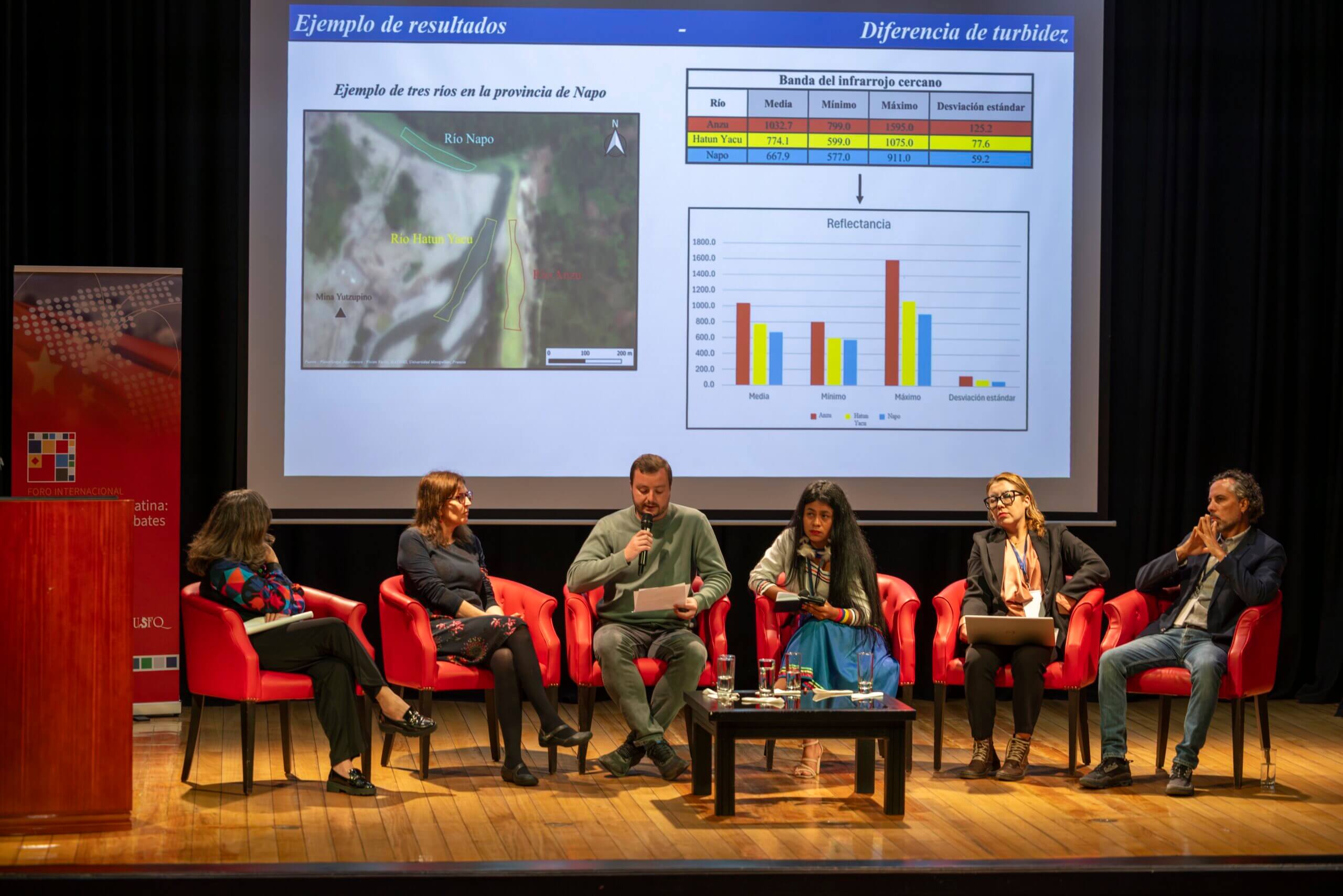Environmental Impact
The seventh panel of the China–Latin America International Forum: Perspectives and Debates brought together experts from Ecuador, Argentina, and France to examine the socio-environmental impacts of extractive and industrial activities linked to China in the region. Through case studies on mining, illegal fishing, and deforestation, the panelists highlighted the challenges faced by local communities, ecosystems, and public policies in the context of these activities.
Roxana Tanguila (Quijos Indigenous Community), Vivian Varlet (Université de Montpellier), and Cheryl Martens (USFQ) presented the joint talk “Mining and Its Socio-Environmental Impact in Napo.” Drawing on both qualitative and quantitative research, they documented the effects of legal and illegal mining — including concessions granted to Chinese companies — on rivers, biodiversity, and daily life in Amazonian communities in Ecuador. Varlet emphasized contamination from heavy metals and the decline in aquatic diversity, while Martens focused on accelerated deforestation and the erosion of ancestral knowledge. Tanguila offered a personal testimony as an Indigenous leader, denouncing the loss of territory, spiritual disconnection, and the social consequences of extractivism, such as displacement and insecurity.
Heleana Zambonino (FLACSO Ecuador) delivered the presentation “Shark Fin Soup in Asia Tonight, Empty Seas in Galápagos by 2050,” examining the impact of illegal, unreported, and unregulated (IUU) fishing on the Galápagos Marine Reserve. Her research showed how overfishing — especially of sharks — threatens not only marine ecosystems but also the scientific tourism sector, a vital economic pillar of the region. Zambonino proposed an institutional management model and a regional geopolitical strategy to ensure sustainable fishing by 2050, supported by data on Chinese vessels operating in the area.
Milko Schvartzman (Circle of Environmental Policymakers, Argentina) concluded the panel with the presentation “Sea of Controversies: The Chinese Fishing Fleet in South America.” Using satellite monitoring tools, he revealed how Chinese vessels deactivate their Automatic Identification Systems (AIS) and use tactics such as twin ships to operate unlawfully in South American waters. Schvartzman argued that while these activities may not reflect official Chinese state policy, they pose significant threats to biodiversity, sovereignty, and regional security.
Together, the panelists underscored the urgency of rethinking extractive development models, strengthening environmental governance, and fostering dialogue between scientific and ancestral knowledge systems to confront the challenges posed by China-related activities in Latin America. en América Latina.
Panelists:

Milko Schvartzman. Environmental Policy Circle
Country: Argentina
Presentation: Sea of Controversies: The Chinese Fishing Fleet in South America

Roxana Tanguila. Universidad San Francisco de Quito
Country: Ecuador
Presentation: Mining and Its Socio-Environmental Impact in Napo

Vivian Varlet. Universidad San Francisco de Quito
Country: Ecuador
Presentation: Mining and Its Socio-Environmental Impact in Napo

Cheryl Martens. Universidad San Francisco de Quito
Country: Ecuador
Presentation: Mining and Its Socio-Environmental Impact in Napo

Heleana Zambonino. Latin American Faculty of Social Sciences (FLACSO Ecuador)
Country: Ecuador
Presentation: Shark Fin Soup in Asia Tonight, Empty Seas in Galápagos by 2050

